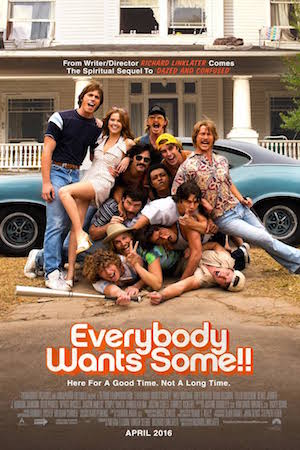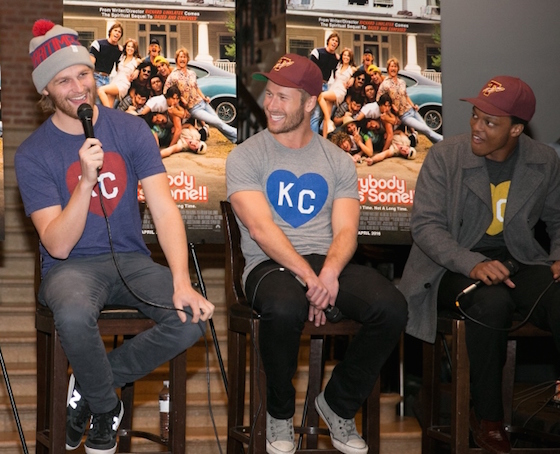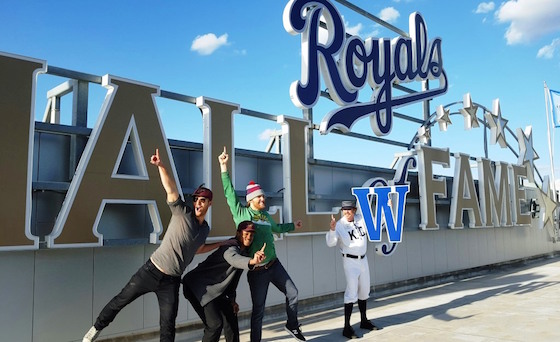 Richard Linklater’s latest film, Everybody Wants Some!! follows a freshman college baseball recruit and his first wild weekend with the team.
Richard Linklater’s latest film, Everybody Wants Some!! follows a freshman college baseball recruit and his first wild weekend with the team.
Billed as a “spiritual sequel” to Linklater’s 1993 cult hit Dazed and Confused, the film features a cast of All-American party boys and all the sounds, clothes and bravado that 1980 had to offer.
After a special early screening and after-party at Kansas City’s Alamo Drafthouse Mainstreet last Thursday, we got a chance to chat with Glen Powell, J. Quinton Johnson, and Wyatt Russell – who play smooth-talking Finnegan, unwavering chill Dale, and Twilight Zone-obsessed Willoughby, respectively – about playing athletes, working with some of the hottest behind-the-camera talent in Hollywood and the movie’s place in the gender conversation.
What was it like living in the 70s/80s?
J. Quinton Johnson: “It’s interesting that [some people feel that EWS!! is set in] the 70s, because Rick says the 1980s. The film is [set] in 1980. Rick said that 1980 is still technically the 70s and that the 1980s didn’t really start until around 1983.”
Glenn Powell: “It was transition time, y’know, in clothing, politics, presence. Everything was kind of shifting and changing, our relationship with the world was changing and I think this movie is about guys who are shifting from either from college to the real world or high school college and figuring out who you are in the framework of that world… So, it was awesome (laughs) to answer your question, it was awesome. The clothes, the hair, the music – everything was just sexier. I love that era.”
JQJ: “And not feeling like you had to live your life and have fun for someone else. Nowadays, we have social media, we have our smartphones and things like that. These parties and things, if it was done today, […] everyone would have their phones out showing people how good of a time your having. But, in that era, it was like we’re having a good time with the people that are actually here.”
GP: “Look, I’m at the Beiber concert!”
JQJ: “Whooo!”
GP: “It’s definitely different. Also, we were athletes who were on the dance floor. Rick talked about [how] athletes were peacockers in every sense of the word. When I was an athlete, you […] were wallflowers. You’d go to practice, you’d do your thing and it’s […] so intense these days. These guys were drinking beer, these guys were partying. Back when I was playing ball, that’s your world, you focused. Now, today it’s so competitive. You’re not out at the club.”
Wyatt Russell: “Not in the same way. I played hockey. You’d go out and get drinks. In Europe, it was different. In Europe, it was like that. Where I played it was just like this but when I was in the states, it’s pretty rigid. And they were making like 40 grand a year. It wasn’t like this thing […] you’re gonna make a ton of money at.
GP: “Rick also talked about the body type of an athlete back then. Now, it’s like there’s supplements and these guys are almost like Adonises. Like, shredded. And [Linklater’s] like, ‘You guys would’ve been in good shape. You’d have been athletes but you don’t necessarily look like athletes. You look like cornfed Texas guys. It’s a different body type.”
You’ve all worked with Richard Linklater now and Glenn, you’ve worked with Ryan Murphy on Scream Queens, and Wyatt’s worked with Phil Lord and Chris Miller on 22 Jump Street – all different, distinctive voices in Hollywood. Is that what you look for when searching for roles and auditioning?
GP: “It’s the only thing we search for. Chris and Phil are killing it right now. Those guys are taking the most random IP and they’ve done the most insanely cool things with it.”
WR: “They’re just super smart people. You meet them and they’re funny but they’re smart. They get it. When you meet someone […] you can tell if they have a vision in their mind about what they want to execute or if they’re chasing some sort of dragon or dream or idea but they don’t have it planned out in their mind.”
GP: “I’ve worked with directors who’ve had a specific reference, like, ‘We’re making The Deerhunter,’’y’know? And I’m like, ‘No, we’re not.’ And the problem with that is that it’s rare to find a director that hasn’t proven themselves. Like [Miller] and [Lord], Richard Linklater, Ryan Murphy – they’ve proven themselves. They obviously have a very particular worldview and they chase it in away that nobody else can chase. Nobody else could make this movie besides Richard Linklater. And, as an actor, that’s all you look for is somebody who’s got a specific taste because a specific taste in a director gives you a specific taste in a character.
In regards to the film’s gender politics, a lot of fuss has been made about them – including, but not limited to, the lack of consistent a female presence in the film. Do you guys have any thoughts on that?
WR: That whole thing is a wash. That’s not what [Linklater] sets out to make movies about. If you wanna make it about that, you can make it about that. That wasn’t his experience, that wasn’t his life. If that was his life, that’s the way he would’ve made it. Movies that are contrived, that are meant to say something about something that didn’t happen – if you want to make a story about it – that’s when it’s open for discussion. When it’s about someone’s life, you can look at the 80s as they were or as you wanted them to be. This was 36 years ago; this is just the way it was. I always find it difficult to answer that question because it doesn’t really apply.
GP: ”I think you’re missing the whole point of the movie if you look at it from a gender equality point of view. It’s about a baseball team so you’re trying to shoehorn that aspect of it in. I think that the Beverly character is a very strong female character who has a lot to say. You see the light of of what you can be and can see in college. We’re a team of fun neanderthals at the end of the day. [Linklater] talked about the essence of what is to go to college and when you have relationships in college. They’re very transient. The first day of school, you don’t know anybody. The first guy you meet is your best friend and that’s how you treat each other. It’s just the nature of what it is in college. The first girl he meets, he sees her and then he hooks up with another girl and then he goes back and he goes, ‘Oh, she was really special.’ He’s try to reflect reality and not trying to push some political agenda.”
Sometimes a good weekend is just a good weekend?
GP: “Exactly – I love the way you phrased that – ‘sometimes a good weekend is just a good weekend.’”
JQJ: “I remember doing literature studies and English and you read a novel and it’s like ‘What does this blue bush mean?’ and ‘What is the significance of this character’s journey?’ And some authors are like sometimes there is some thought behind that stuff but, if you go too deep into it, you’re completely missing the point.”
GP: “And I feel like that’s why a lot of movies suck these days, because they’ve been executive-noted to death. This movie was made with love in Bastrop, Texas without the pressure from a studio that was noting it to death. It’s all from [Linklater’s] life, his heart and our lives – we got to kind of collaborate with him – but the problem is that you can water down an amazing movie when you overthink it.”






Comments on this entry are closed.